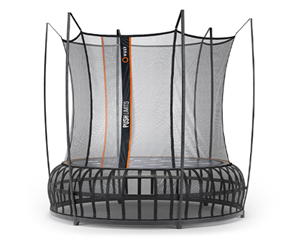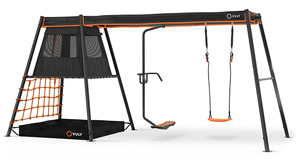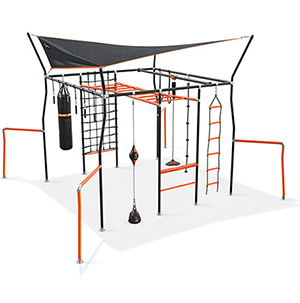Key Highlights
-
The National Disability Insurance Scheme (NDIS) delivers funding for “reasonable and necessary” supports tied to a person’s disability and goals.
-
Early childhood intervention (ages 0-6) offers support without a formal diagnosis; from age 7+ the child must have a significant and permanent disability to access NDIS funding.
-
Participants develop an individualised NDIS plan outlining goals, funding, and supports; funding can be self-managed, plan-managed or NDIA-managed.
-
The NDIS may fund play and exercise equipment (such as trampolines or swing sets) when they support therapeutic or developmental outcomes.
-
You have the right to request a review of your NDIS plan or a decision if you’re unsatisfied with your supports.
If you have a child with a significant and permanent disability, you may be able to seek support from the National Disability Insurance Scheme (NDIS).
The NDIS is run by an independent statutory agency, the National Disability Insurance Agency (NDIA), and their aim is to provide peace of mind for people and the families and carers of people who are living with a significant and permanent disability.
This incredibly valuable insurance scheme provides financial and community support to ensure that families impacted by disability have access to the best possible resources, opportunities, and education.
The NDIS funds reasonable and necessary support for participants and is available across Australia. The NDIS also receives government funding and is partially funded through the Medicare levy.
What is Reasonable and Necessary Support?
This refers to the support your child needs to meet their disability support needs.
When assessing the reasonable and necessary support for a participant, the NDIS will look at informal supports that are already in place (such as family or friends) as well as formal support like health and education services.
To be reasonable and necessary, the support must be related to your child’s disability, must be value for money, and must be likely to work and benefit your child.
Any support must also be based on evidence.
The NDIS helps to improve access to social participation, health, and wellbeing.
For children with disabilities, this can include play equipment, due to the fact that outdoor play can help children increase their independence and improve their health.
This may allow you to spend NDIS funding on trampolines, swing sets, monkey bars or other outdoor and backyard equipment.
However, the NDIS may not fund such equipment if they consider it to be an everyday item most people are likely to have in their home, or it is already available and accessible in your community or through community providers.
When the NDIS is looking to decide what support is reasonable and necessary, they refer to the rules and guidelines of the National Disability Insurance Scheme Act 2013.
For more information on what are reasonable and necessary supports, please review this article on their website.
The NDIS has also published some example cases here regarding sensory equipment, explaining some reasons for funding being granted or not.
How to access NDIS funding
If your child has a disability and they don’t automatically receive funding entitlements - you do have to apply for them.
When your child meets NDIS access requirements, they are called a participant. A participant receives funded support and a plan to help them achieve their goals.
NDIS access requirements include the availability of the NDIS in your area, age, residency status, disability, and early intervention requirements (if applicable).
To check whether the NDIS is operating in your area, search on their website.
NDIS funding for children aged 0-6 years
If your child is between 0 and 6 years old they do not need a diagnosis of a disability to access support.
The NDIA has partnered with early childhood providers across Australia to provide support through their Early Childhood Intervention (ECEI) program.
If concerns about your child’s development have been identified by a physician or healthcare professional, you can reach out to an early childhood partner through the NDIS website.
An early childhood partner can tailor support to your child and can offer information to help identify the support you and your child need.
They can also connect you and your child with support in your community and can provide short-term, early intervention.
In the longer term, they can also help with accessing NDIS support, and if your child becomes an NDIS participant they’ll work with you to develop your child’s NDIS plan.
If your child becomes an NDIS participant, you’ll be offered:
- Information and emotional support for your child and your family
- Access to health services, playgroups, and support groups
- Early intervention support like speech therapy and occupational therapy.
Your early childhood partner will help to develop your child’s individual NDIS support plan and will submit this to the NDIA for approval.
Once your child’s plan is approved your child will start to get NDIS funding.
Step by step guide for seeking NDIS support for your child (aged 0-6 years)
- Contact the NDIA and get information about the NDIS in your area. You can call the NDIA on 1800 800 110.
- Meet an NDIS early childhood partner who will discuss your child’s needs
- Work out the level of support your child needs. This might include emotional, community, and strategic support.
- Make up an individual NDIS plan for submission
- Explore early intervention support and select your providers
- Put your child’s plan into action
NDIS funding for children aged 7 and over
If your child is aged 7 and over they will need to have a significant and permanent disability to access the NDIS.
This disability needs to impact his or her ability to take part in everyday activities
Want to confirm whether your child can access the NDIS? Use their checklist online.
If your child does meet the access criteria, you will then meet with an NDIA planner or NDIS local area planner who will help you access information and support.
The title of the person you work with will depend on your area, but the support is the same.
When you meet with your local support person, you’ll talk about your child’s needs and developmental and access goals.
You’ll go through the type of support your child is getting currently, and how well this support works.
You will go through how you’re managing, and how daily activities take place, and you’ll also be able to explore the kind of support you think your child needs to meet their goals both now and in the future.
You might have a meeting with a specialist, and you might have to attend a few meetings to get a full picture of how your child is progressing.
Once your NDIS professional has a full understanding of your child’s disability, they will work with you and develop an NDIS plan for your child.
This plan will be submitted to the NDIA for approval. Once approved, the plan will be put in place and you’ll start to receive funding.
Step by step guide for seeking NDIS support for your child (aged 7+ years)
- Contact the NDIA on 1800 800 110 for information about the NDIS in your area.
- Meet an NDIA/NDIS coordinator who will discuss the needs of your child and your family.
- Make up an individual NDIS plan for submission, including the support your child needs to reach their goals. Your coordinator will submit this to the NDIA for approval.
- Choose service providers for your child’s NDIS plan.
- Put your child’s plan into action
Your Individualised NDIS Plan
As mentioned above, you’ll work with a professional to develop an NDIS plan for your child.
This plan will be founded on the goals and developmental achievements that you and your child are hoping for.
Your child’s plan might include things like support from the NDIS, support from community organisations (not funded by the NDIS), and informal family and community support.
A plan will also include your child’s aspirations and the financial support your child will need to pursue these goals.
The NDIS has a lifetime commitment to supporting the people who need it the most, recognising that as your child grows their plan will change.
Ultimately, choosing how to manage your child’s NDIS plan rests with you and your family.
Your child, wherever possible, should be involved in managing how their plan progresses to give them independence and confidence.
Options for managing your child’s NDIS plan
When considering how best to administer your child’s NDIS plan, you have a few options. And indeed, you can choose to have a lot or a little bit of help - it’s up to you, your child and your family to decide.
Self-managed funding
You can choose to administer the funding for your child or have a nominee do it on your behalf. A nominee might be another family member, a support person or a carer.
NDIA managed
You can choose from the service providers the NDIS work with and administer your child’s support through them.
The NDIA can help you find registered service providers. NDIA then pays them directly so you don’t have to worry about financial payments.
Plan management provider
An option that may work best for you could be working with a registered plan management provider to manage some or all of your child’s funding support.
A plan management provider can find and coordinate your child’s support, make payments to providers, and look after paperwork.
You might also choose to use a combination of self-management and a registered management provider.
It will depend on the level of involvement and how much time and capacity you have to administer your child’s plan.
What the NDIS Will Fund
There’s no minimum funding under the NDIS, and you can use the NDIS to access the support your child needs, regardless of your situation or diagnosis.
The support that is funded by the NDIS can include things like speech therapy, occupational therapy, and movement therapy.
It might also include technology or devices that help your child to move through life easier. NDIS funding can also include modifications to your home where needed.
The NDIS will provide the reasonable and necessary support that is specifically needed for your child’s disability or developmental delay.
Reasonable and necessary support can include things like:
- Skill building
- Vacation care
- Therapy support and behavior support
- Mobility equipment
- Aids and access equipment
- Home and transport modifications
- Disability-specific parent and carer training
- Support and ongoing care
The NDIS generally won’t fund support that:
- Isn’t related to your child’s disability
- Is part of day to day living and that isn’t related to your child’s disability and support needs
- Duplicates other support provided by mainstream avenues like health or education providers
As an example of this, the NDIS will offer support to you and your family in the way of accessing therapy for early intervention.
However, it won’t assist in the modification of a building that your child needs to access (like a preschool) because this is the responsibility of the early childhood education system.
Again, for school-aged children, NDIS support will extend to things like specialist transport to get to school but won’t extend to teachers or learning aids like in-class computers, because these are the requirement of the early childhood education system.
How to Use NDIS Funding to Access Outdoor Play Equipment
When seeking appropriate support for your child, the NDIS offers therapeutic support funding which allows your child to access the appropriate equipment for their health and development.
A NASA-funded study in the 1980s demonstrated the health benefits of jumping on a trampoline, while more recent 2016 research from American researchers found that trampolining may help with balance training and spatial awareness.
This is because the trampoline user has to “react to an unstable surface while performing a wide variety of movements.”
Further to this, occupational therapists are known to use trampolines in their therapeutic sessions because of the engagement of balance and body awareness.
Therapists use trampolining because it’s fun, and an engaging way to encourage stronger muscles and to improve overall muscle tone.
When you’re putting together your NDIS plan, it’s possible that you could include a requirement that your child has access to outdoor play equipment like a trampoline.
Not only is a trampoline a fun way to exercise, but it’s also proven that trampolines have health benefits.
Managing Your Child’s Plan and Disputing Support
If you’re not satisfied that your child’s NDIS plan is providing the care and support that you had hoped for, then you can request a review of the plan.
The NDIA is responsible for ensuring that your child receives the reasonable and necessary support. They will perform a review of your child’s NDIS plan and will determine an outcome.
If you aren’t happy with the outcome of the NDIA review, you may seek an external review through the Administrative Appeals Tribunal.
Ultimately, the NDIS exists to give people with disabilities a voice, and greater control over their lives.
If you are a parent living with a child with disabilities, it’s important to know that you have the support you need to give your child the best opportunities you can.
Whether it’s access to the support you need in your community, or the aids and devices your child needs to communicate effectively, the NDIS is here to help.
It’s important that you feel satisfied with the support your child is getting, and there are options for you if you just don’t feel that this is the case.
If your child doesn’t meet the NDIS access requirements, there are still a lot of options and supports available to you.
The NDIS can also refer you to different organisations such as disability-specific care programs.





























































